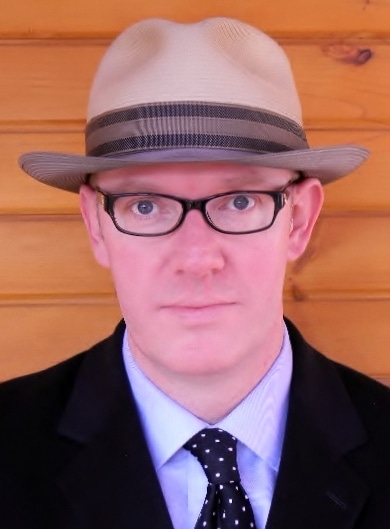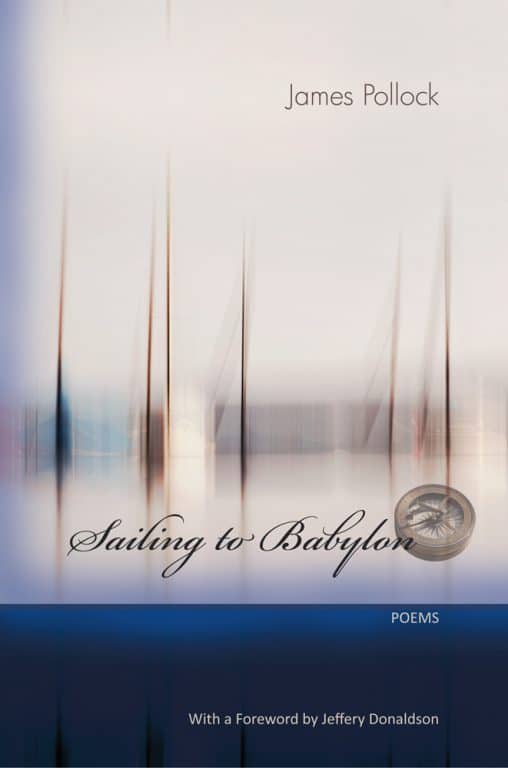
James Pollock is the author of Sailing to Babylon (Able Muse Press, 2012), a finalist for the Griffin Poetry Prize and the Governor General’s Literary Award in Poetry, and winner of an Outstanding Achievement Award in Poetry from the Wisconsin Library Association; and You Are Here: Essays on the Art of Poetry in Canada (The Porcupine’s Quill, 2012), a finalist for the ForeWord Reviews Book of the Year Award for a collection of essays. He is also editor of The Essential Daryl Hine (The Porcupine’s Quill), which made The Partisan‘s list of the best books of 2015. A new book of his poems, Durable Goods, is forthcoming from Véhicule Press/Signal Editions in September, 2022. His poems have appeared in The Paris Review, AGNI, Plume, The Walrus, and many other journals. They have also won the Manchester Poetry Prize, theMagma Editors’ Prize, and the Guy Owen Prize from Southern Poetry Review, and have been reprinted in anthologies in Canada, the U.S., and the U.K., including The Next Wave: An Anthology of 21st Century Canadian Poetry. His essays and reviews have appeared inContemporary Poetry Review, Canadian Notes & Queries, Literary Review of Canada,and elsewhere. He graduated from York University in Toronto, earned a Ph.D. in Literature and Creative Writing from the University of Houston, and is now Professor of English at Loras College. He lives with his wife and son in Madison, Wisconsin.

Judges’ Citation
The sentence, in James Pollock’s remarkably assured debut volume, is a unit of music and of time, a carefully modulated choreography that moves the reader through an elegantly constructed set of meditations on place and history and the education of the self…
The sentence, in James Pollock’s remarkably assured debut volume, is a unit of music and of time, a carefully modulated choreography that moves the reader through an elegantly constructed set of meditations on place and history and the education of the self — a self we come to know, in part, through the poet’s evocation of a rich company of tutelary spirits: Glenn Gould and Northrop Frye, Henry Hudson and C.P. Cavafy. Quietly confident, formally adept, assured in their music, these artful lyrics are not only an accomplishment in themselves but promise to register, as the poet says, ‘the breaking changes of a life to come’.
Selected poems
by James Pollock
Its glassy look suggests one hypnotized
from gazing at the house across the street
as if into a mirror: a man half-crazed
with disappointed love. Look how distraught
after the vivid morning he appears
now in the gathering shade of afternoon,
how filled with darkness, how the darkness pours
like flames in silence out of every pane
across the unmowed lawn into the trees.
But when the stifling air grows vague with dusk,
and the sky is overwhelmed with cloudy towers
that blot the stars like battlements of dust,
the boy inside turns on the lights and sings
the sympathy of not inhuman things.
Copyright © 2012 by James Pollock
House
after Cavafy
The Franklin Expedition, 1845-48
When you set out to find your Northwest Passage
and cross to an empty region of the map
with a headlong desire to know what lies beyond,
sailing the thundering ice-fields on the ocean,
feeling her power move you from below;
when all summer the sun’s hypnotic eye
won’t blink, and the season slowly passes, an endless
dream in which you’re forever diving into pools,
fame’s image forever rising up to meet you;
when the fall comes, at last, triumphantly,
and you enter Victoria’s narrow frozen Strait,
and your Terror and Erebus freeze in the crushing floes;
in that long winter night among the steeples
of jagged ice, and the infinite, empty plain of wind and snow,
when the sea refuses to be reborn in spring,
three winters pass without a thaw, and the men,
far from their wives and children, far from God,
are murdering one another over cards;
when blue gums, colic, paralysis of the wrists
come creeping indiscriminately among you;
and you leave the ships, and set out on the ice,
dragging the lifeboats behind, loaded
with mirrors and soap, slippers and clocks,
into the starlit body of the night,
with your terrible desire to know what lies beyond;
then, half-mad, snow blind, even then,
before you kill the ones who’ve drawn the fatal lots,
and take your ghastly communion in the snow,
may you stumble at last upon some band of Inuit
hauling their catch of seal across the ice,
and see how foolish you have been:
forcing your way by will across a land
that can’t be forced, but must be understood,
toward a passage just now breaking up within.
Copyright © 2012 by James Pollock
Northwest Passage
In the Museum of Death the guests are eating lunch
made from a dead man’s recipe.
They use knives and forks invented by the dead.
Everyone sits in a room
built by those who are no longer with us,
everyone speaking words the dead have made.
Everything is archaeological:
prayer, toilets, table manners, cash.
Even the air was once breathed by the dead.
Look how impatiently the curator taps
his fingers on his desk. It’s getting late.
Very soon the guests will have to go.
Copyright © 2012 by James Pollock
The Museum of Death
If only he could watch his teacher read
and, gazing, could lean there at his desk
in the winter light of Hillcrest Public School
and listen as she speaks the strangest words—
with her vivid face, her braided hair
and dark eyes like a real and ordinary
siren’s—if only he could wait like that
forever while Miss Harmon reads The Odyssey
(his kind young teacher with the ringing voice
he loves so much he lets the story sing
into his heart), she would peal out for him,
swaying above him like a slender bell,
the breaking changes of a life to come.
Copyright © 2012 by James Pollock